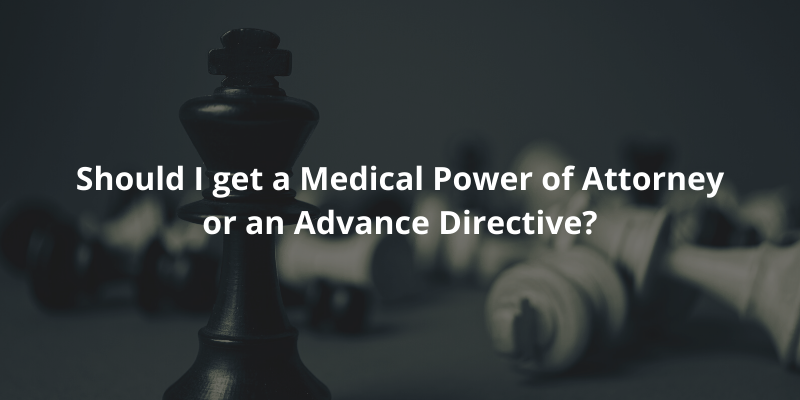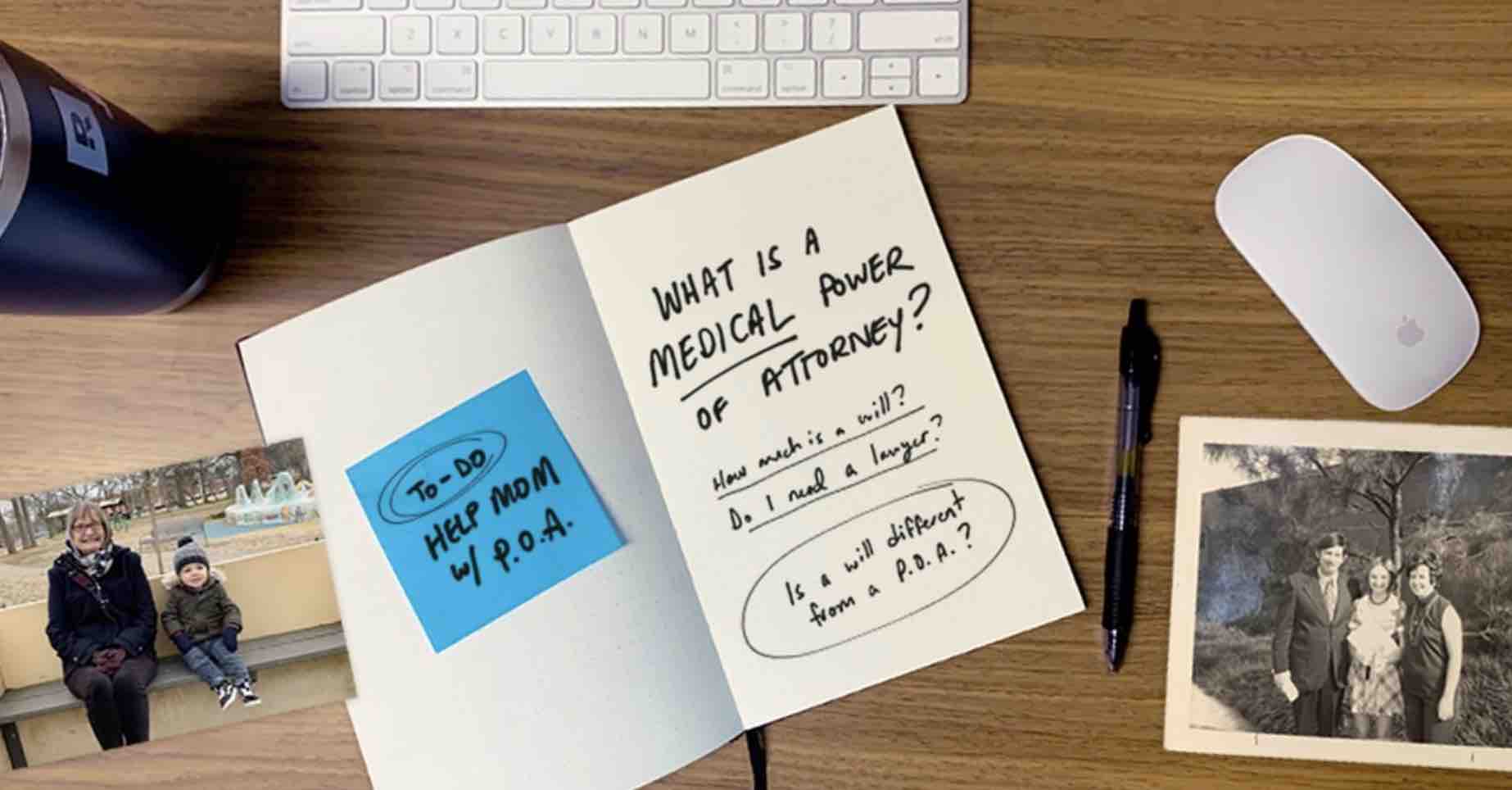Making Your Wishes Known: Understanding the Differences between Advance Directives, DNRs and Medical POAs
30 Jan 2023
12 Jul 2020
min read

Life and death medical decisions are difficult personal decisions, but they are even more difficult when you are unable to make them yourself due to unconsciousness from a medical condition. You may have heard that an Advance Directive, a Do Not Resuscitate (DNR) Form, or a Medical Power of Attorney (Medical POA), can be useful for advance care planning. However these 3 documents sound very similar, let's first understand what they are and what are their differences before deciding which form of document to use.

A. Advance Directive
What is an Advance Directive?
An Advance Directive (also known as a "Living Will") is a statement, usually in writing, in which a mentally competent person indicates what medical treatment he/she would refuse at a future time when he/she is no longer mentally competent. It is a legal document that relates the writer’s personal preferences on end-of-life medical treatment. It lists the procedures and medications that one wants or does not want to have e.g. whether or not to prolong your life.
Advance Directive is helpful in situations where the patient is unable to talk to the doctors themselves, e.g. when one loses mental capacity due to dementia or terminal illness, when one is under anaesthesia for a surgery, when one is having a complication during surgery or when one is unconscious from a sudden medical condition or accident.
What is included in an Advance Directive?
When creating an Advance Directive, what do you need to include in the document? The questions below are helpful indicators. They may be difficult questions to decide on, but they will take away the burden on your loved ones when the time comes.
-
What would you want to do when you can no longer breathe on your own?
- Do you not want to suffer from the discomfort of invasive treatment and prefer comfort care?
-
Do you want feeding tubes if you can no longer eat by yourself?
-
What types of pain management drugs or procedures would you be comfortable with?
-
Do you want to be resuscitated when there is a medical emergency?
-
Do you want to donate your body or organs after your death?
If you have a special medical condition or allergies to specific medication, it would also be essential for you to include these in the Advanced Directive as well.
To prepare an Advance Directive is to plan ahead. Setting out your wishes beforehand will save your loved ones from the situation where they have to make difficult and agonizing life-and-death decisions about you. Sharing your Advance Directive with your family members will also help mentally prepare your loved ones for your wishes during medical emergencies.
B. Do Not Resuscitate (DNR) Form
What is DNR?
The DNR form is completed by a patient in advance to instruct healthcare providers not to perform Cardiopulmonary Resuscitation (CPR) if the patient’s breathing stops or the heart stops beating. If the patient is too sick to complete the form, a DNR order can also be made by a doctor taking into account the best interests of the patient, including the patient's known or possible wishes. The legal status and process of DNR forms and orders vary from country to country. The most common situation is that medical orders are made by the patient with the doctor on the basis of medical judgments, patient wishes and moral values.
When is a DNR Appropriate?
When a patient stops breathing or a cardiac arrest occurs, performing CPR may represent the best chance of life. However, there are many factors that affect the results of CPR, such as the physical condition of the patient and the risk of long-term neurological dysfunction after CPR. The benefits of CPR must be weighed against the potential burden on the patient.
Consideration of the benefits and burdens of CPR is not only a clinical decision but also in the best interests of the patient, including their known or possible wishes. In general, there are 3 underlying principles to take into account when considering a DNR:
- the view of the patient and the family - which involves the quality of life considerations by the patient and the family;
- the principle of the futility of treatment - whether the treatment is ineffective or in vain and merely prolongs the pain and suffering of the patient;
- the best interests of the patient principle - asking the question of whether the treatment is really in the best interests of the patient to maintain life.
C. Medical Power of Attorney (POA)
What is a Medical POA?
A medical power of attorney, which is also known as a Medical POA or Health POA, is a legal document one uses to authorise an attorney to make difficult health care decisions on your behalf. This is also known as an Enduring/Continuing/Durable/Lasting Power of Attorney in different jurisdictions, which means that the Power of Attorney will last even after the loss of mental capacity by the donor.
For medical POAs, the attorney is only authorised to use the power that the Medical Power of Attorney gives them, and only when your doctor determines that you are unfit to make major decisions for yourself.
This is fundamentally different from the general power of attorney, where the attorney is given a broader general power, and financial power of attorney, where the attorney only makes decisions on financial matters. As these attorneys are acting as your conduit on your behalf, the power of attorneys will be revoked as soon as you lose mental capacity.
Who should I appoint as my attorney?
In addition to the requirements for the attorney to be a mentally competent person who is aged 18 or above to be legally valid, a Medical Power of Attorney would potentially be given tremendous power to decide the medical treatment and health decisions on your behalf. These are life-and-death decisions. As such, this must be someone that you trust your life with.
This may seem to be a daunting emotional task but for you to choose an attorney on your own will protect your friends and family from being burdened with difficult decisions regarding your health in such an emotional and difficult time.

D. Difference between Advance Directive, DNR and Medical POA
What is the difference between an Advance Directive, a DNR and a Medical POA?
While an Advance Directive, a DNR may sound quite similar to a Medical Power of Attorney, they are not the same thing. When you are incapacitated and unable to communicate your wishes, you can either (i) facilitate self-determination through an Advance Directive by providing advance refusal of life-sustaining treatment to minimize distress or dignity; (ii) refuse CPR in advance through a DNR form or ask your doctor to issue a DNR order; or (iii) have family members or someone you trust to make difficult life and death decisions when facing a serious irreversible illness through a Medical POA.
Having an Advance Directive or a DNR form will allow for:
- Ease of Burden – the documents ease the difficulties and distress that may otherwise be suffered by the family members in managing the patient’s affairs and avoid having family members make difficult life and death decisions for the patient in time of crisis.
- Self Determination - the documents respect the wishes of and allow for an individual to choose the person or persons who will look after the individual’s affairs if he/she becomes incapable of doing so.
To put it simply, an Advance Directive or a DNR form is a self-determination in medical decisions whereas a Medical Power of Attorney is to appoint someone to make medical decisions on your behalf. A DNR order, on the other hand, is made by your doctor in the best interest of the patient.
What it really comes down to is a piece of paper versus a person. So which one should you choose?
Advance Directive
An Advance Directive can be effective and easily understandable. However, even if the document lays out your preferences on medications, and surgical and personal care options, the Advance Directive is limited. It is limited to what you know when you wrote the living will. But what if after you wrote your will, there are new medical breakthroughs and a new surgery or a drug was developed that could save your life?
An Advance Directive will also not apply unless a doctor certifies that you are permanently unconscious or in a situation where your life will potentially end. But what about situations where you are only temporarily unconscious?
In these situations, an Advance Directive will not give your loved ones the authority to share your wishes with the doctors as an Advance Directive will not appoint a medical representative for you.
DNR
DNR form is essentially a simple form of an advance directive which lays out essentially one thing - advance refusal of CPR in case of a cardiac arrest. DNR does not mean giving up other life-sustaining treatments nor does it gives preferences in other medical, surgical or personal care options. In case of a DNR order, you don't get to choose at all, your doctor will decide for you after discussing it with your family members.
Medical Power of Attorney
A Medical Power of Attorney basically creates for you a “health care proxy” that acts as your attorney to make your medical decisions when you can’t talk to the doctors yourself. So instead of a piece of paper, you have a person that will speak and act in your best interests while honouring your original wishes.
Compared to an Advance Directive, a Medical Power of Attorney is a lot more flexible. When there are new treatments/ options available or in times when Advance Directives will not come into play, you will still have a trustworthy person to decide what are the crucial medical decisions for you.
However, the only way for a Medical Power of Attorney to work effectively is to trust in the person that they will act in your best interest and honour your wishes well. But humans are emotional and undetermined creatures so how can you ensure that your attorney will definitely go with your wishes? This is especially crucial in life-and-death situations when your attorney would hope for you to hang on while you may be inclined to opt for a Do-Not-Resuscitate option.
E. Advance Care Planning
So should you sign a DNR form, Medical POA or an Advance Directive?
This is where advance care planning would come in. Advance care planning is the process of communication between you, your healthcare providers, family members or caregivers regarding the kind of care that will be considered appropriate when you can no longer make a decision.
You can (i) express values, wishes and preferences for future care (medical or personal) and appoint an attorney to carry out your wishes, (ii) make an advance directive to indicate your care preferences and refuse life-sustaining treatments, or (iii) sign a DNR form to refuse only CPR. The making of a medical POA, DNR form or an advance directive is entirely voluntary. You can decide whether, how and when to make a medical POA, DNR form or an advance directive in the advance care planning process.
Having an Advance Directive or a DNR is important as it lays out clearly and transparently to doctors and your loved ones your wishes on your end-of-life treatment. It is a dignified way of self-determination. But having a Medical Power of Attorney will offer you more flexibility than a piece of paper – making sure your wishes will be heard and that you will receive the best care possible (including future treatments that you don’t yet know of!). In that way, you can be reassured that someone you trust will be given the power to be flexible in what could be an unpredictable situation concerning your life and death.
It is possible to create an Advance Directive, a DNR and appoint an attorney through a Medical Power of Attorney, so one option you can choose is to do both at the same time. It is not uncommon for the three documents to be used alongside but separately. However, in case of conflicts between the three documents, your decision made in the Advance Directive will generally override that of the attorney. This may have different consequences depending on your situation:
Example 1 - you have end-stage chronic obstructive pulmonary disease was admitted to the hospital for respiratory failure, where you received intubation before recovery. Upon discharge, you signed an Advance Directive deciding against further intubation if you developed respiratory failure again as you do not want to suffer from the discomfort of the invasive treatment and preferred comfort care. At the same time, you have given a Medical Power of Attorney to your attorney. If you are admitted to the hospital again for respiratory failure and become mentally incompetent as a result, even if your attorney urges the doctor to intubate you, your wish under your Advance Directive will stand.
Example 2 - there a new drug is developed that may be fitting for your situation and your attorney learns about this and wants to try it on you. However, your Advance Directive does not specify that you will be willing to try this drug. In this situation, your attorney will not be able to ask doctors to prescribe this drug to you. This is because the Advance Directive will override your attorney. As such, it may be more helpful if you just appoint an attorney to make medical decisions on your behalf instead.
Ultimately, this is your life, so choose carefully what you would like – self-determination or some flexibility through an attorney? If you have both documents, the best way is to get your attorney to read through your advance directives and understand your wishes to ensure consistency in decisions making.
Here are some templates that you can use when drafting a Medical POA a DNR Form and an Advance Directive:
Medical Power of Attorney |
Advance Directive |
|
1 Attorney: https://docpro.com/doc1620/medical-power-of-attorney-1-attorney |
Standard form: |
|
2 Attorneys: https://docpro.com/doc1622/medical-power-of-attorney-2-attorneys |
Do Not Resuscitate (DNR) Form |
|
3 Attorneys: https://docpro.com/doc1621/medical-power-of-attorney-3-attorneys |
Standard Form: |
When Should You Make a Medical Power of Attorney, DNR or Advance Directive?
Perhaps you will ask: what situations would you ever need a Medical POA, DNR or Advance Directive?
People often believe that nothing would be so serious that will prevent you from being able to speak directly to doctors about your medical care, but as unfortunate as it is, such situations actually happen more often than people would think.
There are many situations where people will need a Medical POA, DNR or an Advance Directive due to a sudden and serious medical condition. For example, when someone falls into a coma due to a brain injury or stroke or has a lapse of mental health that prevents them from making sound decisions.
You should also plan ahead, if you have a family history of illness that loses the ability to effectively communicate due to disease or dementia, you should certainly consider preparing an Advance Directive, a Medical POA or DNR.
Both of these documents will help to:
- Reduce Disputes – the documents reduce the number of expensive and potentially distressing court proceedings for the appointment of another person to look after the individual’s medical affairs.
- Efficiency – the documents provide an efficient and cost-effective way of administering the individual’s property; and allow professionals to proceed efficiently based on the person’s wishes.
The brutal truth is unfortunate things will happen in life and as uncomfortable as it is to discuss death and life-sustaining treatment, it is much worse to have to discuss these topics when you are already in a hospital and unable to speak.
If you do not have a Medical POA, DNR or an Advance Directive in place, your loved ones may have to go to court to fight for the right to decide on medical decisions on your behalf, adding to the emotional burden them in this personal heart-wrenching crisis.
In serious medical situations like these, your family and friends will need the authority to control what medical care will be best for you. This will usually be a time is of the essence situation as they need to decide the best treatment for you fast. A Medical POA, DNR and an Advance Directive then are powerful legal tools that can act as a megaphone for you or, if you choose, your chosen attorney to step in and speak in this urgent situation. Without it, the family’s voice and your wishes might not be heard.
Formalities of making an Advance Directive, a DNR and a Medical Power of Attorney
Please note that different jurisdictions have different formalities for the execution of Advance Directive, DNR and Medical POA, in particular, relating to (i) the format of the documents, (ii) witnessing requirements (certain jurisdictions require a doctor or a lawyer to be a witness) and (iii) registration requirements. Please check your local requirements before execution.
Please note that this is just a general summary about the medical power of attorney and advance directives under common law and does not constitute legal advice. As the laws of each jurisdiction may be different, you may want to speak to your local legal adviser.
Keywords:



